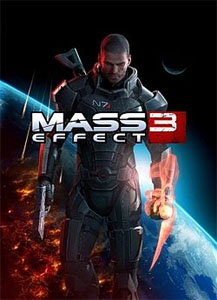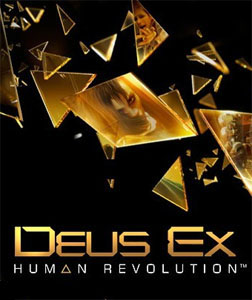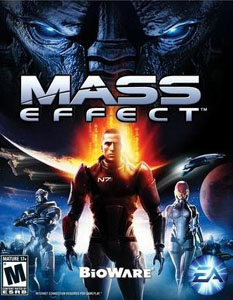 I’ve been playing through the Mass Effect trilogy over the past two weeks. It is, hands down, one of the greatest video game experiences I’ve ever had. It is also, through the virtue of its immersion, one of the most intense narrative experiences I’ve ever had.
I’ve been playing through the Mass Effect trilogy over the past two weeks. It is, hands down, one of the greatest video game experiences I’ve ever had. It is also, through the virtue of its immersion, one of the most intense narrative experiences I’ve ever had.
It is not, however, without flaw and today I want to talk about one of them: The negation of tough choices.
To do this, obviously, I’m going to need to discuss some spoilers. First, I’m going to do a pass on some MINOR SPOILERS for two of the loyalty quests in Mass Effect 2. Then, I’m going to talk through some MAJOR SPOILERS for the end of the game. Control your reading accordingly.
MAKING TOUGH CHOICES
Creating tough choices in a video game is hard work. First, you need to sufficiently immerse the player into the game world that they care about the outcome of the choice. Second, the choice needs to have real consequences.
The bad news is that the former is fleetingly rare and the latter is seen as exponentially increasing development costs. (This is based on a fundamentally limited understanding of how to implement choice consequences in video games, but that’s a topic for another time.)
The good news is that these two factors easily end up feeding into each other: Making a tough choice will immerse the player into the experience, which will make them care more about the outcome of future choices, which will make those choices tougher, which will further immerse the player into the experience… and so forth.
One common mistake among game designers is to mistake calculations for choices. I’ve talked about this previously and you should also check out this episode of Extra Credits. The short version is that game players are often presented with what looks like a huge number of choices, but because those “choices” all boil down to different ways of accomplishing the same thing, the “choice” is really just a calculation of which method is the best for accomplishing a given goal.
Meaningful choices, on the other hand, often involve elements of sacrifice: You have to give up one thing you want in order to gain another.
Most games featuring “moral choices” fall into this trap: Yahtzee at Zero Punctuation has frequently made the case that many of these games only offer simplistic – and oftentimes simple-minded – choices (“go out of you way to get food for these hungry orphans or burn their orphanage down”). But the more systemic problem is that these games don’t actually offer any choice at all.
See, in most of these games there is the “good track” and there is the “bad track”. If you follow one track you get the “good guy content”; if you follow the other track you get the “bad guy content”. At best, this means that there is only one choice: Which set of content do you want to see first?
Once you’ve made that choice, every other choice in the game is reduced to mere calculation: Which choice will accumulate the most points for the track I’ve chosen?
MINOR SPOILERS
The Mass Effect games feature a similar “moral track” in the form of their Paragon vs. Renegade scale. And although there are elements of calculation still present in the system, Bioware manages to frequently sidestep the problem in three ways.
First, there are plenty of points to go around and a little dabbling on the Renegade track won’t screw up your Paragon play-thru. This means that you’re free to make a more complex pattern of choices.
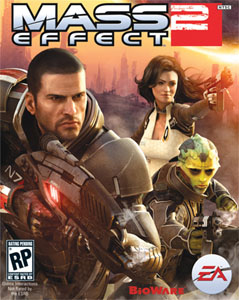 Second, the definitions of Paragon and Renegade are a bit more complex than just “goody two-shoes” vs. “purest evil”. (“Paragon” means that you’ll generally be helpful, sympathetic, and play by the rulebook. “Renegade” means that you’ll generally do what you want, take shortcuts, and expect people to take care of themselves.) This means that Bioware’s writers can, for example, offer several different “flavors” of Paragon choices in response to a given situation.
Second, the definitions of Paragon and Renegade are a bit more complex than just “goody two-shoes” vs. “purest evil”. (“Paragon” means that you’ll generally be helpful, sympathetic, and play by the rulebook. “Renegade” means that you’ll generally do what you want, take shortcuts, and expect people to take care of themselves.) This means that Bioware’s writers can, for example, offer several different “flavors” of Paragon choices in response to a given situation.
Third, Bioware presents you with choices which impact more than just your moral meter.
And this last is the real key. It’s what allows Bioware to give you legitimately tough choices.
For example, during the loyalty mission for the mercenary Zaeed in Mass Effect 2 you’re confronted with a choice: You can either help Zaeed pursue his twenty-year vendetta or you can turn aside to help save a group of civilians.
It sounds really simple, but the effect in the game was positively electric: I’d been playing a character who was primarily a Paragon, so saving the civilians should’ve been a no-brainer. But loyalty in Mass Effect 2 is really important: First, you won’t have full access to the abilities of your NPC allies unless they’re loyal. Second, the game had made it really clear that you needed the loyalty of your crew if you wanted to survive the suicide mission at the end of the game. (The game had even suggested pretty heavily that there was a no-win scenario in which you might win Mass Effect 2, but end up dead and unable to import your character into Mass Effect 3. I don’t know if that’s actually true or not, but the game certainly made me believe it while I was playing it.)
In short, the game suddenly presented me with a choice which had a huge impact both mechanically on me as a player and narratively on the game world. As a result, it was a truly tough choice: Do I stick to my morals and do the right thing? Or do I let those civilians die and do what has to be done in order to ensure that my team is ready for the final mission?
I eventually chose to save the civilians. And that choice was immensely satisfying on multiple levels.
Imagine my disappointment, therefore, when Bioware negated that choice five minutes later.
See, when I got to the end of the loyalty mission, I was given a paragon conversation option that sweet-talked Zaeed into being loyal despite the fact that I had just screwed him over. In other words, I made a Paragon-aligned decision that carried with it significant consequences; but because I had made so many Paragon-aligned decisions, I was given the option to negate those consequences.
MORE MINOR SPOILERS
This problem actually crops up frequently during Mass Effect 2: You make a tough choice, but making the tough choice rewards you in a way which directly allows you to negate the consequences of the tough choice.
Another notable example of this can be seen in Tali’s loyalty mission. At the end of that mission, you’ve gained possession of evidence that’s needed to exonerate Tali. But, for various reasons, Tali doesn’t want you to use it. So you’re faced with a tough choice: Do you honor your friend’s request to suppress the evidence and watch her get emotionally devastated when she’s exiled from her home? Or do you betray your friend in order to protect her?
That is an inherently fascinating choice. (Particularly because, at this point, I’ve spent about 70 hours in Tali’s virtual company and I really, genuinely care about her as a character.) I eventually chose to honor Tali’s request and suppress the evidence.
But, yet again, I found the consequences of this choice negated: Using a paragon-conversation option, I was able to still talk the judges into finding Tali not guilty despite the lack of exonerating evidence.
What’s interesting about this example, however, is that there’s another level on which this was still a tough choice: See, the nature of the evidence would also potentially have a profound effect on the politics of Tali’s people. If they have the evidence, they’ll likely go one way. If they don’t have the evidence, things will probably go the other. And there is no right answer: It’s a question of your values, your opinions, and your hopes.
If we can ignore for a moment the fact that half of the tough choice ended up being negated, we can take a moment to appreciate how beautiful this choice really is: Either choice would be an interesting one. But by adding a second, independent layer of consequences, the writers of the game exponentially complicated the choice and made it virtually impossible for anyone to divine a truly “right” answer to the conundrum.
MAJOR SPOILERS
My intention here should not be misinterpreted: I critique the points where Mass Effect 2 comes up short only because it so often gets it right, and in the process provides a structural road map for how other games can do better.
And the pay-off for a game that is filled with meaningful choices – which convinces you through sheer weight of evidence that your choices do matter and that they will have an effect – can be truly immense.
By the end of Mass Effect 2, the games had taught me three things:
- The decisions I make can result in the death of major characters.
- That wrong decisions could create a no-win scenario in which the game could not be completed.
- The fate of the galaxy was on the line. (And that really did matter.)
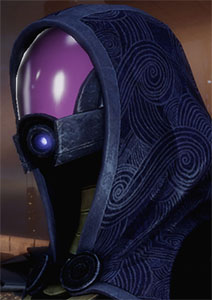 So when I got to a point during the final mission where I was forced to make a personnel decision about which of my teammates was going to have to go on a solo operation, I was absolutely convinced that I was being asked to choose which of my teammates was going to die. But I was also absolutely convinced that if I didn’t pick the best person for the job, then the entire mission might fail.
So when I got to a point during the final mission where I was forced to make a personnel decision about which of my teammates was going to have to go on a solo operation, I was absolutely convinced that I was being asked to choose which of my teammates was going to die. But I was also absolutely convinced that if I didn’t pick the best person for the job, then the entire mission might fail.
And the game didn’t pull any punches. It said, “Choose anybody you want.” And it would have been easy to pick one of the characters I hadn’t formed a strong, emotional bond with to play the martyr. But I knew who was most qualified: It was Tali. Tali who had gone on virtually every mission with me in the first game. Tali who had been a shining beacon of joy when she finally joined the crew. Tali who had helped to alleviate the immense sense of alienation and loss that I’d been experiencing for most of the game.
I couldn’t kill Tali. I moved the cursor off her name. Went scrolling for somebody I could bear to lose. But… I couldn’t afford not to send Tali. I needed the people with the best skills in the right place at the right time. So the cursor worked its way back up to Tali.
That’s when I realized there were literally tears streaming down the sides of my face.
…
So. Yeah. The Mass Effect trilogy. You should play it.
FINAL THOUGHTS
The most impressive thing about that specific moment, in retrospect, is that I really don’t expect most players of the game to experience it: It depended heavily on my personal experience with Mass Effect (in which my favorite moments were “adventuring with Liara and Tali”), compounded with a reaction to the narrative of Mass Effect 2 which may be largely idiosyncratic, and then culminating in a decision that seemed to target Tali specifically (although that may not actually be true).
By contrast, the death of Aerith in Final Fantasy VII – another powerful, emotional moment for me as a gamer – is a moment that’s literally shared by every single person who ever played Final Fantasy VII.
But I do think that specifically because of the rich panoply of tough choices in the Mass Effect games, most people playing the games will have a comparable moment of emotional resonance. And the relative uniqueness of those moments will only serve to enhance them.
 I bought a PS3 because because it was the cheapest and best Blu-Ray player on the market. The ease with which the PS3 has been upgraded through firmware to stay current with the latest improvements in the Blu-Ray standard (including 3D) have repeatedly confirmed that this was a smart decision.
I bought a PS3 because because it was the cheapest and best Blu-Ray player on the market. The ease with which the PS3 has been upgraded through firmware to stay current with the latest improvements in the Blu-Ray standard (including 3D) have repeatedly confirmed that this was a smart decision.
